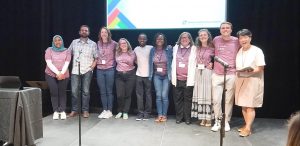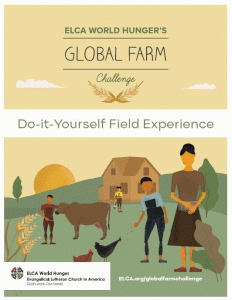Another blog post from ELCA World Hunger Education Intern Aml Mohamed. In this blog, she continues to seek answers to the three questions posed in her first blog. This blog is a response to her second question: “Why would I care as a practicing Muslim to work at a Lutheran faith-based institution?”
In July, I participated in the ELCA World Hunger Leadership Gathering in Minneapolis, Minnesota. During one of the skill-building sessions, participants and staff members had the chance to practice one-to-one conversations. I had a beautiful chance to discuss faith and how it plays a part in our personal and professional life with a colleague.
I wear my faith on my head. By choosing to wear the Hijab, a hair covering, it is noted by some that I am likely a Muslim. In various settings this is the first thing they notice about me, especially in a  large gathering like the ELCA World Hunger Leadership Gathering. Sometimes, I do not think about it much, as it is part of me. However, I welcome those reflective questions about being of a different faith and my work. When the questions are asked properly, they do not reflect bad intentions– they reflect curiosity. They make me reflect on my own experience. I was about to respond to a participant’s question about my experience at the ELCA as a Muslim person, but they soon interrupted me. They said: “I am sure there are common things in our religions that support and encourage community work and care for hunger.” I nodded with a smile. I was happy to see that this was the assumption for why I do the work I do. But, is that enough?
large gathering like the ELCA World Hunger Leadership Gathering. Sometimes, I do not think about it much, as it is part of me. However, I welcome those reflective questions about being of a different faith and my work. When the questions are asked properly, they do not reflect bad intentions– they reflect curiosity. They make me reflect on my own experience. I was about to respond to a participant’s question about my experience at the ELCA as a Muslim person, but they soon interrupted me. They said: “I am sure there are common things in our religions that support and encourage community work and care for hunger.” I nodded with a smile. I was happy to see that this was the assumption for why I do the work I do. But, is that enough?
To answer this question, I will return to the conversation about faith I had with my colleague and reflect on this question: do we do the work we do because of our community-driven personalities or because of our faiths?
It is not one answer or the other. I never thought of my religion as the source of my passion to work on community development. I mean, I am just a regular college student who is passionate about making a change in a small way. At the ELCA, the Lutheran faith that shapes the work is clear in many ways, such as praying before a meal or the start of the event. Is that what makes a faith-based organization different? The prayers? During the conference, it was often mentioned that God is a God of abundance. God created so much that there is more than enough to feed everyone on earth, yet there is hunger. I was confused. How can God be a God of abundance and allow hunger in the world? I soon realized in my conversation with my colleague that their work is driven by their faith grounded in hope. I realized that there is energy in people that have hope while their feet are on the ground. They know that there is too much to do, however, there is something that can be done.
I am not an Islamic scholar or a researcher, but when I heard the phrase God created abundantly, I reflected on this verse in Surat Hud 11:6 in the Quran: “And there is no creature on earth but that upon Allah is its provision.” Allah is the Arabic word for God, and it is used by Arabic-speakers of all Abrahamic faiths, including Christians and Jews. This is the English translation of the verse, but the Arabic word for Provision is Rizq. Rizq means so many things, which is the beauty of Arabic. Rizq means livelihood, sustenance, nourishment, daily bread, blessings and more. So, God says that every creature, not just humans, is provided for. God did not even limit the provision meaning to food or wealth, but it takes many shapes.
My personal belief that there are enough resources, ideas and energy is what pushes me to think that is possible to develop and sustain communities. It is not simple or easy to access those resources for many reasons in our world today. But, faith is my source of hope and energy. I know that there is unlimited human energy that should be invested wisely to make positive change. Working with ELCA World Hunger made me realize that faith grounded in hope points us towards change that can be done. This where I found my common ground. I saw that a faith-based organization like ELCA World Hunger achieves so much by reaching out to the community of active and caring individuals and ministries to work together. The source of hope to push and continue working on problems comes from faith in a God who provides abundantly – or for me, faith that one’s rizq is provided by God.
At the beginning of the summer I asked myself as a practicing Muslim, would I care about working at a Lutheran Church? Now, at the end of the summer, I look back, and I see how much I learned about my faith, even while immersed in Lutheran faith. I learned that caring for social change is not an impossible mission if people find common ground in their faith and worldviews to work together.


